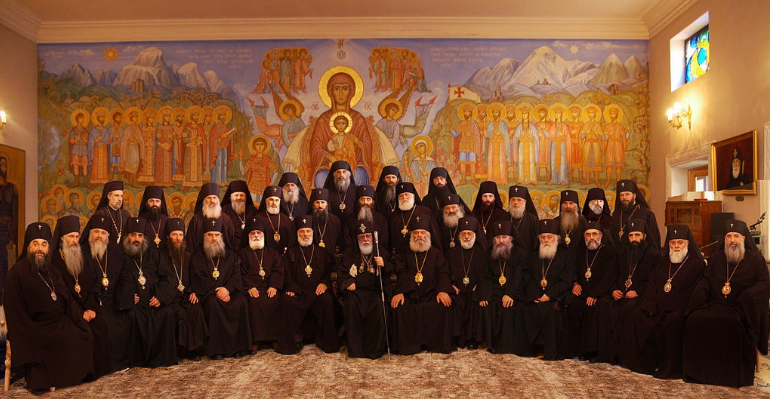
Dismissed by Synod, Chkondidi Bishop says Patriarch ‘Possessed by Homosexuality’
- GOC's Synod dismisses Bishop Petre of Chkondidi
- Dismissed Bishop: Ilia II 'beset by pederasty'
- Holy Synod says allegations 'unfounded'
- Synod seeks pardon for Archpriest Mamaladze
- Holy Synod Gives Archbishop Iakob Warning
- On October 26, Archbishop Iakob claimed during PM Kvirikashvili's tenure, Gomelauri, Gakharia asked him to help in dismissing Ilia II
The Holy Synod of the Georgian Orthodox Church, reconvened on October 31 under the chairmanship of patriarch Ilia II (86), presiding over the meeting almost after one-year pause, following a nearly one-year hiatus. The Synod decided to dismiss Bishop Petre Tsaava (of Chkondidi) for insulting the Patriarch and the Holy Synod “publicly, on multiple separate occasions.”
In a statement released on October 31, the Holy Synod said Petre Tsaava (of Chkondidi Diocese, based in Martvili and Abasha both located in Western Georgia’s Samegrelo region) has been barred from continuing to carry out his clerical duties and his status as a member of the Holy Synod has been revoked. Moreover, the Holy Synod has banished Bishop Tsaava to a monastery to atone for his actions.
According to the Holy Synod, senior clerics called on Petre Tsaava to repend of his actions which the synod claims include “insulting the Catholicos-Patriarch, voicing groundless accusations, engaging in slander and committing other canonical violations,” but he did not plead guilty and rejected the Holy Synod’s calls for repentance. By decision of the Holy Synod, Bishop Giorgi Katsia was appointed as the interim head of the Chkondidi Eparchy.
Petre Tsaava responds to the Synod, says Patriarch obsessed with ‘pederasty’
Petre Tsaava, who walked out of the Synod meeting before its end, was the first to inform the media of the Synod’s decision to dismiss him, calling it “unfair.” Tsaava cited “disclosure of pederasty, homosexuality and pederast sins within the Georgian church” by him as the reason behind the Holy Synod’s decision.
Asked by journalists, whom he disclosed, Petre Tsaava responded: “The chairman of the Holy Synod, Catholicos-Patriarch of Georgia… The nation has the chairman of the Synod, who is possessed by the sin of pederasty, homosexuality.”
Later yesterday, Petre Tsaava reiterated his remarks in interviews with Rustavi 2 TV and Mtavari Arkhi TV where he argued that he intended to present the witnesses at the Holy Synod meeting, including “the victims of the sodomy sin.”
Members of the Holy Synod maintain that Petre Tsaava’s allegations were unfounded.
Holy Synod seeks presidential pardon for Archpriest Giorgi Mamaladze
The Holy Synod also discussed the case of Archpriest Giorgi Mamaladze, who was found guilty into the so called “cyanide case”, and decided to solicit presidential pardon for him.
On September 5, 2017, Giorgi Mamaladze was found guilty of his role in plotting the murder of Shorena Tetruashvili, the Patriarch’s assistant, as well as for the purchase and storage of firearms, and which resulted in him being sentenced to nine years in prison. The Court of Appeals upheld the lower instance court’s ruling.
During the entire period, Mamaladze’s family has maintained his innocence. Citing his health problems, the family raised the issue of presidential pardon several times, though their appeals have been in vain.
- New Inmate Pardoning Rule Discussed at President’s Administration
- Facing Criticism, President Suspends Pardons
- Prosecutors Probe Recent Presidential Pardon
Earlier Mamaladze’s family requested that the Patriarchate of Georgia lodge an official appeal for the archpriest’s pardon. His brother even erected a tent first outside the headquarters of the Patriarchate and then outside of Parliament demanding Mamaladze’s release. A couple of days ago, he threatened to publicize the archpriest’s letter if the Holy Synod refused to discuss the issue of pardoning him; he, however, did not reveal the content of this letter.
Holy Synod Gives Archbishop Iakob Warning
The Holy Synod members also discussed public remarks made by Archbishop Iakob Iakobashvili (of Bodbe) several days ago, claiming that the Archbishop “has repented” for his “inappropriate public remarks.” The Holy Synod let him off with a warning but vowed to enact strict measures if he repeats his actions in the future.
Speaking in a telephone interview with TV Pirveli on October 26, Archbishop Iakob said that during Giorgi Kvirikashvili’s tenure as Prime Minister, then Head of State Security Service, Vakhtang Gomelauri and Prime Minister Giorgi Gakharia, who was then Interior Minister, contacted him and asked for his help in dismissing Ilia II and appointing Metropolitan Shio Mujiri, the Georgian Patriarch’s locum tenens, as the new Catholicos-Patriarch. He also hinted at plans involving the murder of the Patriarch, though did not specify the mastermind behind the idea.
Speaking after his meeting with the Georgian Patriarch on October 28, Iakob Iakobashvili told reporters that he decided to step down from his position as Chorepiscopos of the patriarch, as well as from the chairmanship of the Patriarchate’s financial-economic council.
The Holy Synod’s members said after yesterday’s meeting that they did not discuss Iakobashvili’s allegations concerning the Patriarch’s dismissal and his attempted murder.
In 2013, Georgia’s deeply entrenched anti-gay sentiments led to violence spilling out in the streets of downtown Tbilisi on May 17 as a large angry crowd, numbering in the thousands and, led by Georgia’s Orthodox clergy, confronted a few dozen Georgian gay rights activists, who wanted to hold a rally to mark the International Day Against Homophobia, Transphobia and Biphobia.
In 2014, in an apparent attempt to counter the IDAHO celebrations, Orthodox Church Patriarch Ilia II introduced the Family Purity Day on May 17, making it a symbolic and contested date for both the Georgian Orthodox Church and the gay rights organizations and activists.
According to all major public opinion polls held in Georgia, Orthodox Patriarch Ilia II, who was installed as the Orthodox Church leader in 1977, is the country’s most revered man. According to a recent NDI Poll, the Georgian Orthodox Church leads the rankings of the most trusted institutions in the country.
This post is also available in: ქართული Русский